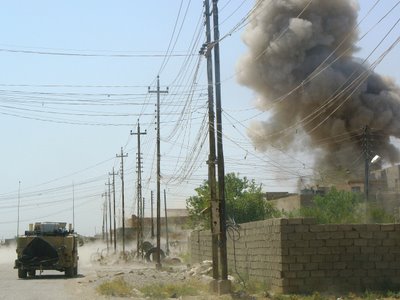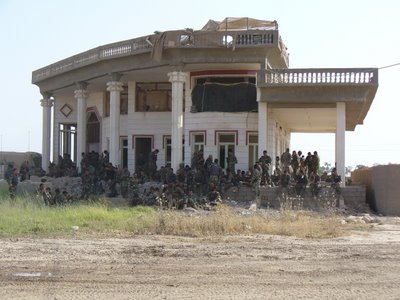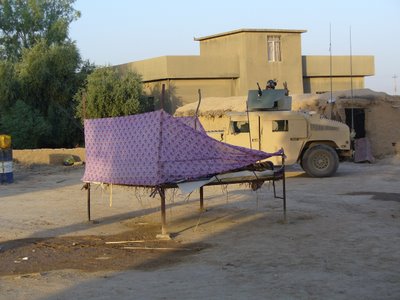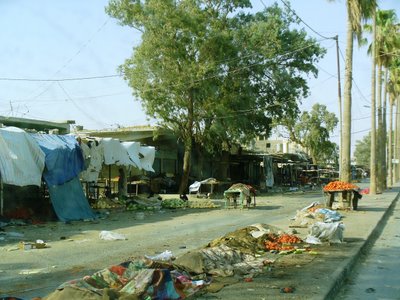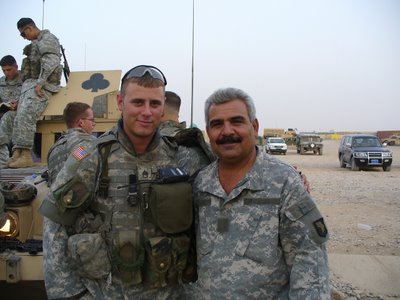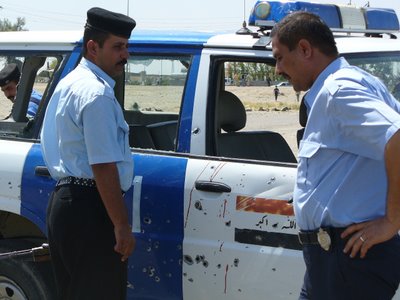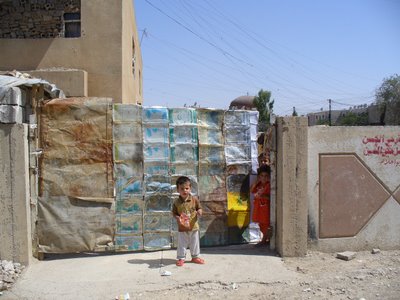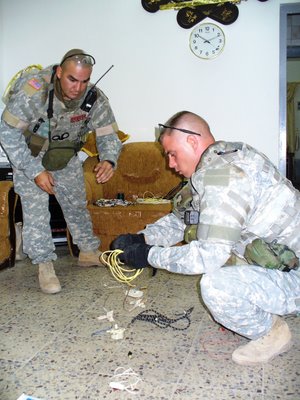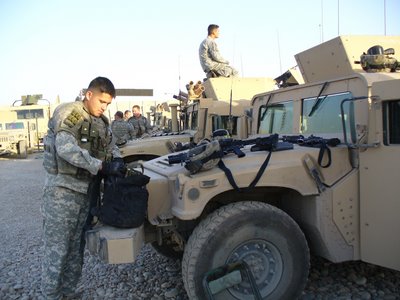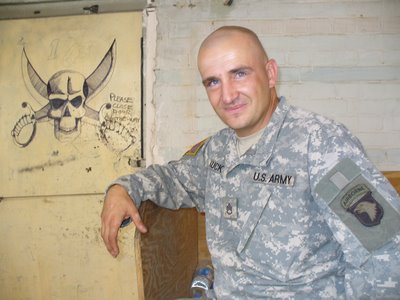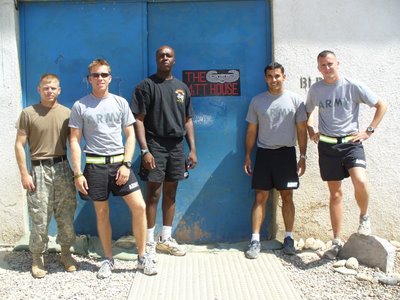Juggling with Balls July 29, 2006
July 29, 2006
The 101st Airborne Division’s 2-320 Field Artillery Battalion, also known as “Balls,” may not get to go on cool missions, but they cover a lot of territory in and around Kirkuk. The soldiers of Balls are responsible for crucial elements of Northern Iraq’s infrastructure, from the Northern Oil Company to power plants all over the region. They work with Iraqi security forces to protect and restore production of these energy resources. Forty percent of Iraq’s oil comes from this region and when production is down, the impact is felt all over the world. We must not discount the importance of Balls.
Much of what the soldiers of 2-320 do is routine, as much as anything in Iraq can be considered routine. We paid a visit to the Mulla Abdullah Power Plant, where Lieutenant Adam Reuter met with the chief of the Electrical Power Systems Security (EPSS), and they discussed the issues of the day. In the Kirkuk region, citizens have electricity for 8-10 hours a day. Supply cannot keep up with demand, and the battle to restore lines and towers is ongoing. As with most organizations involved in the rebuilding of Iraq, EPSS officers are reluctant to act without American assistance, to make decisions without our guidance. This reluctance to embrace and assert their independence delays progress.
The chief of the power plant’s security team was obviously hard-working and dedicated. He had taken it upon himself to devise security plans for all of the area power plants, which sat in a stack on his desk. But this level of commitment is unusual, and it is difficult for one reasonable man to motivate the less industrious, especially when they are tasting freedom for the first time. It is understandable that he would look to his American friends for support.
Also on the agenda at the power plant was a first aid class led by Medic Vernon Prewitt. As the light faded outside, Prewitt instructed a group of security officers in the treatment of wounds. These officers are not targeted by insurgents in the way Iraqi Police and Army forces are, but anyone working to improve conditions in Iraq is somewhat vulnerable.
A second trip off the base, this time with Captain Adam Cmerek and other members of the battalion, revealed another set of power-related issues. Our convoy was headed for Riyadh, a problematic area near Hawijah, when we took a side trip to investigate a fire on the oil pipeline running through the area. The fire was visible from miles away, dark billowing smoke drifting across the horizon. Iraqi soldiers on guard duty had no theories about how the fire had started.
The Iraqi Army (IA) presents its own set of challenges. In some regions, the Iraqi soldiers share our goals. In other areas, sometimes just down the road, there is little common ground. Many of the Iraqi soldiers serving Riyadh wear the uniform and collect a paycheck, but have no sense of duty to the people of Iraq. For the American soldiers who work day after day to improve living conditions in Iraq, this is extremely frustrating. It is frustrating as a bystander to see our soldiers, who radiate a sense of duty and who represent us so well, dismissed by members of the IA who have no clear goals of their own except to undermine our efforts.
We visited an IA battalion headquarters where an IED had gone off. That it had been planted within the boundaries of IA property, presumably guarded by Iraqi soldiers, was an indication that this had been an inside job. Why? Iraq is a country that raises more questions than it answers.
On day three with Balls, the power struggles continued. Sergeant Franklin Taylor led a convoy to Dubiz, a town north of Kirkuk, to meet with members of the Oil Security Forces, who guard the country’s most important resource. As we approached our destination, a group of Iraqi police officers flagged us down. Obviously distraught, they explained through our interpreter that an officer had been killed. They were guarding a gas station when a large group of Iraqi soldiers tried to force their way to the front of the line. Shots were fired, and an Iraqi police officer was killed. His body lay in the bed of their truck, covered with a blanket.
The gas situation is baffling. Production is down, partly because since the war began oil refineries have been forced to close and have not re-opened; meanwhile, demand has increased. Still, it is hard to understand how a region frequently referred to as “oil-rich” could be suffering from a fuel shortage.
The soldiers of 2-320 work with several groups to protect Iraq’s resources. Our goal is to distribute power democratically. The EPSS and OSF officers support our mission, but hesitate to take charge. The Iraqi Army and Iraqi Police are unpredictable and, as a result, unreliable. In theory, they are on the same side, and in theory they are on our side. They want power but not the responsibility that comes with it. They want us to leave, but they appear incapable of cooperating with each other, thereby forcing us to stay.
The future of Iraq is not in our hands. It is not in the hands of insurgents, or corrupt officers or soldiers. The future of Iraq is in the hands of the Iraqi people who have yet to take responsibility for their part in the rebuilding of their country. The soldiers of the 2-320 Field Artillery Battalion are helping to show them the way. Our soldiers provide an excellent example of democracy in action, but it is up to the Iraqis to become more active themselves. The ball is in their court.
shelbymonroe@gmail.com
